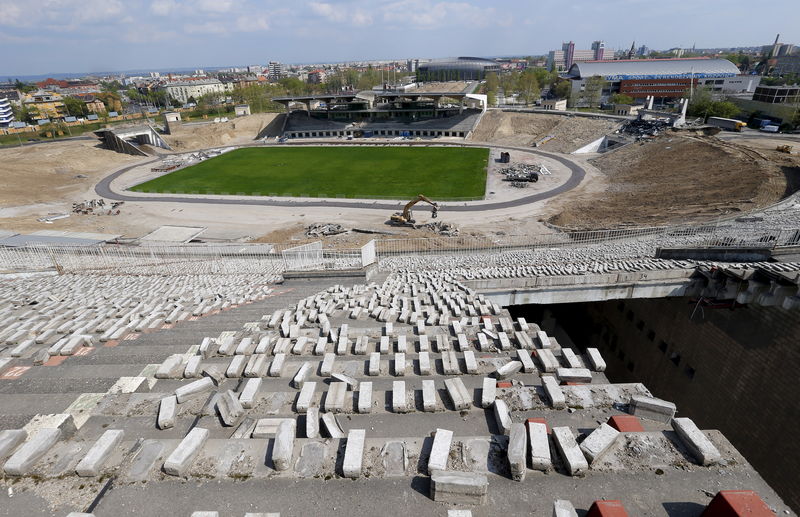By Marton Dunai
BUDAPEST (Reuters) - Hungary is plying Olympic authorities with visions of a 2024 games played out from the elegant Danubian capital Budapest to the shores of Lake Balaton, eschewing the extravagance of recent years in a turn to a more modest global sporting celebration.
Hungary is wagering its offer of a more frugal summer games than those that might be offered by richer rivals Los Angeles, Paris and Rome will better reflect the spirit of the International Olympic Committee's Agenda 2020 - a new policy seeking a return to simpler values and smaller price tags.
A return to more modest, functional facilities, less lavish ceremonies, could break the hold of bigger cities like, this year, Rio De Janeiro, which with its economic and political troubles has highlighted the hazards of hosting.
"The IOC returns to its roots," said Balazs Furjes, the Hungarian government's commissioner for the Games. "Antwerp, Stockholm, or Helsinki once hosted very successful Olympics; each is smaller than Budapest. The IOC wants to make that possible again."
The 2024 Games will be the first time that principle is put into practice, and the IOC hopes 11-digit price tags for facilities that would go largely unused after the Games will become a thing of the past.
"There have been maybe twenty cities around the world that had a chance to host the Games, and they rotated," Hungarian Olympic Committee Chairman Zsolt Borkai told Reuters.
"At last smaller cities have a shot now."
Hungary is not without its own problems. Prime Minister Viktor Orban has been criticized by EU allies for moves to reshape the judiciary and tighten control on media as well as his hard line on migrants.
The London Games in 2012 cost an estimated $26 billion - but those Games are often mentioned as a good example for the widespread use of temporary facilities.
Beijing 2008 costs ran to nearly $40 billion. Athens 2004, at $16.7 billion, is widely seen as an example for inefficiency and Sochi 2014's $50 billion budget drew scorn for exuberance. There have been signs of even some bigger cities, such as Boston, baulking at taking on the ever increasing burden.
"The IOC (will) invite potential candidate cities to present an Olympic project that best matches their sports, economic, social and environmental long-term planning needs," the IOC said in Agenda 2020.
Chief among other points, venues are now welcome beyond the host city to better use existing facilities or sustain new ones.
Hungary has targeted its bid to exploit Agenda 2020 features. It involved eleven cities, including sailing and golf near Lake Balaton, Central Europe's largest lake and a popular resort in the west of the country.
What Hungary lacks in facilities will mostly be built by 2024 regardless of the Olympics, which means much lower Olympics-specific costs, Borkai said.
"This is not money we throw away," Borkai said.
LOW VISIBILITY
The bid has had limited international visibility, with little social media presence. Moreover, Rio and its political and social turmoil could work against Budapest.
"It is likely to be a case of the IOC going for a safe choice, one with experience, infrastructure and financial clout," said an Olympic consultant who has worked for bid and host cities, on condition of anonymity.
The likelihood of coming up short, however, does not deter Hungarians, said several people involved with the bid.
"Winning the games for a first time bidder is always a huge challenge, but you can only win the Games if you entered the race," said Attila Szalay-Berzeviczy, founder of the Budapest Olympics Movement.
"The whole process can be up to 10-20 years long. We saw that in London, where the games were won by Tony Blair but the closing ceremony was done by David Cameron."
NECESSARY?
Even when the Olympics were not seriously on the agenda, Hungary invested in its sports infrastructure.
The Orban government has supported a veritable building spree in recent years despite growing resistance among some voters. Even the country's National Stadium is being torn down to make way for a 65,000-seat soccer arena by 2019.
A spectacular swim complex is under construction by the Danube for next year's World Aquatics Championships - seen as a key opportunity for Budapest to make its mark weeks before the 2024 Olympic Games are awarded in September 2017.
The green-liberal party LMP (Politics Can Be Different) is among the few opponents of the Budapest Games at home, largely because they see the Games as unaffordable. LMP Budapest Council member Antal Csardi said he would prefer the Games in the 2030s.
"Agenda 2020 can help make the Olympics cheaper only in a country that has 80-90 percent of the infrastructure in place already. We start from scratch."

($1 = 275.1000 forints)